WisconsinBoating
Laws & Regulations
Who needs to take the Wisconsin boaters safety course?
All boaters born on or after January 1, 1989 must have a Wisconsin Boating Safety Certificate to operate any motorized watercraft. BOATERexam.com® is a delegated provider for the Wisconsin Department of Natural Resources. Please note that you must have a DNR number to get your boating safety certificate. For more information on the DNR number, please visit the DNR site.
Returning user? Log in here
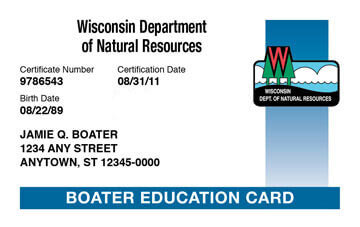
Approved by the
Wisconsin Department of Natural Resources

Good for life!
Get your official
Wisconsin Boating License
Wisconsin Boating Safety Requirements
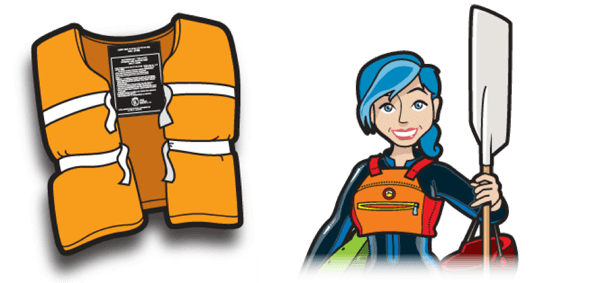
Personal Flotation Devices (PFDs aka Life Jackets)
When boating in Wisconsin, you are required to have at least one U.S. Coast Guard-approved Type IV throw-able PFD, either a ring buoy or seat cushion, on recreational boats that are 16 feet in length or longer. In addition, you must have at least one wearable Type I, II, III, or V PFD for each person on board, regardless of the length of vessel. Make sure the wearable PFDs are readily accessible.
You should also be aware of the following PFD requirements in Wisconsin:
- Type V PFDs are approved but must be worn to be considered legal.
- Flotation devices that are ripped or in poor condition are not considered approved.
- All personal watercraft occupants must wear a PFD at all times.
Wisconsin law states that the owner and/or operator of a vessel is responsible to carry, store, maintain, and use the safety equipment required by the federal safety equipment requirements adopted by the U.S. Coast Guard.
Federal PFD Wear Regulation for Children
Federal regulations require that children under 13 years of age, that are not in a cabin or below deck, must wear a PFD on all recreational boats while underway.
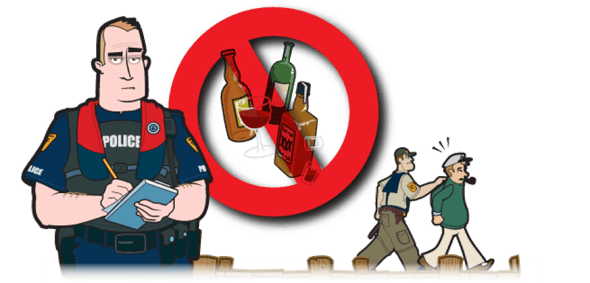
Alcohol & Boating Under the Influence (BUI)
In Wisconsin, it is illegal to operate a vessel or be towed by a device, such as water-ski, tube, or wakeboard, while intoxicated or under the influence of any controlled substance.
A recreational boater with a blood alcohol content of .08% or more shall be presumed to be under the influence of alcohol.
Wisconsin’s "Zero Tolerance" law prohibits persons younger than 21 from consuming alcohol and operating a vessel with any measurable alcohol level.

Wisconsin Boat Registration
All powered boats, including those with gasoline, diesel and electric motors, that are principally operated on Wisconsin waters must be registered with the Wisconsin Department of Natural Resources.
The following vessels are exempt from this requirement:
- Sailboats that are no more than 12 feet in length, as long as they are not fitted with a motor;
- Vessels that are manually propelled and not equipped with a motor or a sail;
- Vessels registered in another state that are operating in Wisconsin for no more than 60 days consecutively; and
- Sailboards.
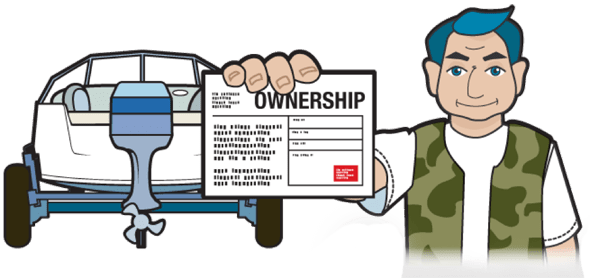
Certificate of Number
Boat owners must have at least a temporary Certificate of Number, or registration, and expiration decals to legally operate a vessel on state waters. Once issued, the Certificate must be signed, carried on board, and available for inspection by an enforcement officer when the vessel is operated.
The Certificate is valid for three years beginning on April 1st and expiring on March 31st of the third year.
The WDNR must be notified within 15 days if the address of residence changes, or if the boat is stolen, destroyed or abandoned. A transfer of the boat ownership terminates the certificate of number and title. The new boat owner will apply through the WDNR within 10 days following the transfer and prior to boat operation for a new title.
If you lose or destroy your Certificate of Number or decals, you must apply for a duplicate along with a processing fee. For more information on registering your watercraft, contact the Wisconsin DNR.
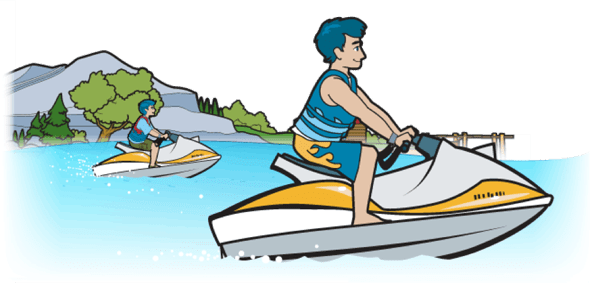
Personal Watercraft Laws & Regulations
As you learned in Chapter 7, personal watercraft are very powerful for their small size and demand the same respect as any boat. In fact, PWC operators must follow the same rules and regulations as any powerboat operator, including registering the watercraft with the state and carrying a B-1 class fire extinguisher on board.
PWCs have some additional regulations:
- It is prohibited to operate a PWC between the hours of sunset and sunrise.
- The operator and all passengers of a PWC must wear a PFD.
- When towing someone on a tube or on water skis there must be capacity on the PWC to accommodate the operator, the observer and the person being towed.
- PWCs must be operated at a distance of 100 feet from other water skiers or others being towed behind a vessel.
- PWCs must be operated at slow-no-wake speed, the slowest possible speed to maintain steerage and headway, when:
- Within 100 feet of any dock, pier, raft or restricted area on any lake;
- Within 100 feet of any vessel; or
- Within 200 feet of shoreline on all lakes, reservoirs, and bays.
- PWC operators must not exceed slow-no wake speed when approaching within 100 feet of any boat or vessel.
- Operating a PWC between the hours of sunset and sunrise is prohibited.